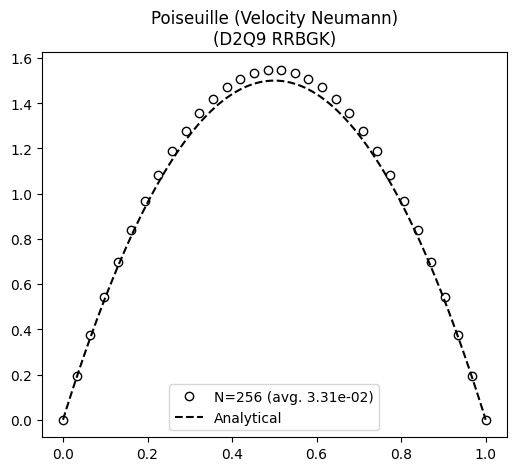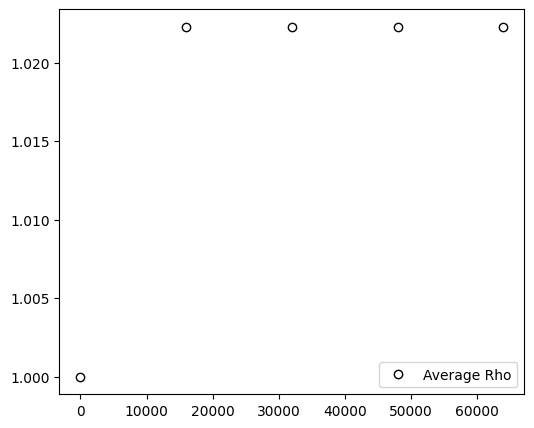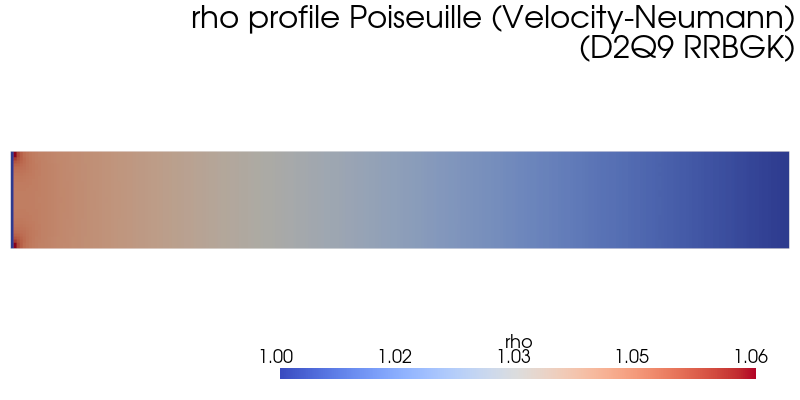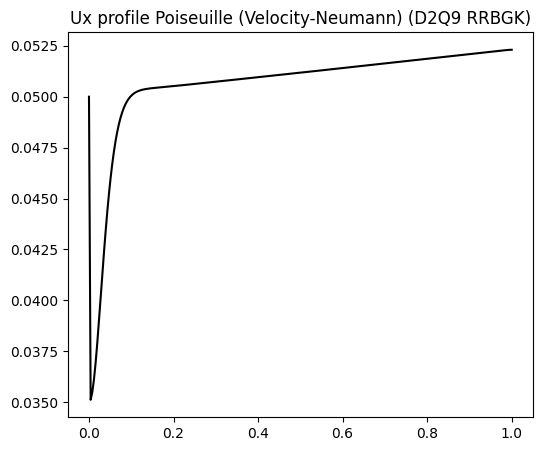Poiseuille Channel (Velocity-Neumann)#
This simulation is used as test for the outlet boundary condition with a fixed pressure. A velocity Bounce-Back BC is used at inlet. The fixed pressure at outlet is meant to avoid a constant increase of the domain average density.
from nassu.cfg.model import ConfigScheme
filename = "tests/validation/cases/02_poiseuille_channel_flow.nassu.yaml"
sim_cfgs = ConfigScheme.sim_cfgs_from_file_dct(filename)
In this case, the domain’s length is much longer than it is for the periodic cases. This assures that the flow will be able to develop before reaching the outlet.
sim_cfg = next(
sim_cfg
for (name, _), sim_cfg in sim_cfgs.items()
if name == "velocityNeumannPoiseuilleChannel"
)
sim_cfg.full_name
'velocityNeumannPoiseuilleChannel:000'
Extract data from multiblock data from output file of macrs export
import numpy as np
from vtk.util.numpy_support import vtk_to_numpy
from tests.validation.notebooks import common
extracted_data = {}
array_to_extract = "ux"
export_instantaneous_cfg = sim_cfg.output.instantaneous
macr_export = export_instantaneous_cfg["default"]
time_step = macr_export.time_steps(sim_cfg.n_steps)[-1]
reader = macr_export.read_vtm_export(time_step)
p1 = [sim_cfg.domain.domain_size.x / 2, 0.5, 0]
p2 = [sim_cfg.domain.domain_size.x / 2, sim_cfg.domain.domain_size.y - 0.5, 0]
line = common.create_line(p1, p2, sim_cfg.domain.domain_size.y - 1)
# Get the points from the vtkLineSource
polyData = line.GetOutput()
points = polyData.GetPoints()
pos = np.linspace(p1, p2, sim_cfg.domain.domain_size.y)
probe_filter = common.probe_over_line(line, reader.GetOutput())
probed_data = vtk_to_numpy(probe_filter.GetOutput().GetPointData().GetArray(array_to_extract))
extracted_data[(sim_cfg.sim_id, sim_cfg.name)] = {"pos": pos, "data": probed_data}
extracted_data.keys()
dict_keys([(0, 'velocityNeumannPoiseuilleChannel')])
Extract data from multiblock data from output file of macrs export for rho plotting
average_data = {}
array_to_extract = "rho"
export_instantaneous_cfg = sim_cfg.output.instantaneous
macr_export = export_instantaneous_cfg["default"]
for time_step in macr_export.interval.get_all_process_steps(sim_cfg.n_steps):
reader = macr_export.read_vtm_export(time_step)
multiblock_dataset = reader.GetOutput()
n_blocks = multiblock_dataset.GetNumberOfBlocks()
blocks_data = []
for i in range(n_blocks):
block = multiblock_dataset.GetBlock(i)
data_array = vtk_to_numpy(block.GetCellData().GetArray(array_to_extract))
blocks_data.append(data_array)
multiblock_avg = np.average(np.concatenate(blocks_data).flatten())
average_data[(sim_cfg.sim_id, sim_cfg.name, time_step)] = multiblock_avg
average_data
{(0, 'velocityNeumannPoiseuilleChannel', 0): np.float32(1.0),
(0, 'velocityNeumannPoiseuilleChannel', 16000): np.float32(1.0222814),
(0, 'velocityNeumannPoiseuilleChannel', 32000): np.float32(1.0222814),
(0, 'velocityNeumannPoiseuilleChannel', 48000): np.float32(1.0222814),
(0, 'velocityNeumannPoiseuilleChannel', 64000): np.float32(1.0222814)}
Extract data from multiblock data from output file of macrs export for profile plotting
profile_data = {}
array_to_extract = "ux"
export_instantaneous_cfg = sim_cfg.output.instantaneous
macr_export = export_instantaneous_cfg["default"]
time_step = macr_export.time_steps(sim_cfg.n_steps)[-1]
reader = macr_export.read_vtm_export(time_step)
p1 = [0.5, sim_cfg.domain.domain_size.y / 2 - 0.5, 0]
p2 = [
sim_cfg.domain.domain_size.x - 0.5,
sim_cfg.domain.domain_size.y / 2 - 0.5,
0,
]
line = common.create_line(p1, p2, sim_cfg.domain.domain_size.x - 1)
# Get the points from the vtkLineSource
polyData = line.GetOutput()
points = polyData.GetPoints()
pos = np.linspace(p1, p2, sim_cfg.domain.domain_size.x)
probe_filter = common.probe_over_line(line, reader.GetOutput())
probed_data = vtk_to_numpy(probe_filter.GetOutput().GetPointData().GetArray(array_to_extract))
profile_data[(sim_cfg.sim_id, sim_cfg.name)] = {"pos": np.array(pos), "data": probed_data}
profile_data.keys()
dict_keys([(0, 'velocityNeumannPoiseuilleChannel')])
Results#
The velocity profile at the end of simulation is compared with the steady state analytical solution below:
Processing functions for Poiseuille Flow case
from typing import Callable
def get_poiseuille_analytical_func() -> Callable:
"""Poiseuille analytical velocity function
Returns:
Callable: Analytical velocity function
"""
return lambda pos: 6 * (pos - pos**2)
def plot_analytical_poiseuille_vels(ax):
x = np.arange(0, 1.01, 0.01)
analytical_func = get_poiseuille_analytical_func()
analytical_data = analytical_func(x)
ax.plot(x, analytical_data, "--k", label="Analytical")
import matplotlib.pyplot as plt
fig, ax = plt.subplots()
fig.set_size_inches(6, 5)
style_num = ["o", "^", "s", "+", "x"]
num_data = extracted_data[(sim_cfg.sim_id, sim_cfg.name)]
num_avg_vel = np.average(num_data["data"])
position_vector = (num_data["pos"][:, 1] - 0.5) / (sim_cfg.domain.domain_size.y - 1)
ax.plot(
position_vector,
num_data["data"] / num_avg_vel,
style_num[0],
label=f"N={sim_cfg.domain.domain_size.x} (avg. {num_avg_vel:.2e})",
fillstyle="none",
c="k",
)
plot_analytical_poiseuille_vels(ax)
ax.set_title(
f"Poiseuille (Velocity Neumann)\n({sim_cfg.models.LBM.vel_set} {sim_cfg.models.LBM.coll_oper})"
)
ax.legend()
plt.show(fig)

The results show that the flow evolution equation from LBM converges to steady analytical solution. The average domain’s density is shown in the plot below:
fig, ax = plt.subplots()
fig.set_size_inches(6, 5)
plotting_data: list[float] = []
axis_data: list[int] = []
for (_, _, timestep), average_val in average_data.items():
plotting_data.append(average_val)
axis_data.append(int(timestep))
ax.plot(axis_data, plotting_data, "ok", label="Average Rho", fillstyle="none")
ax.legend()
plt.show(fig)

It can be seen that the average density quickly stabilizes after certain simulation time.
import pyvista as pv
array_to_inspect = "rho"
plotter = pv.Plotter(window_size=(800, 400))
time_step = macr_export.time_steps(sim_cfg.n_steps)[-1]
multiblock_file = macr_export.time_step_filename(time_step, ".vtm")
mesh = pv.read(multiblock_file)
mesh.set_active_scalars(array_to_inspect)
plotter.add_mesh(mesh, cmap="coolwarm")
plot_title = f"{array_to_inspect} profile Poiseuille (Velocity-Neumann)\n({sim_cfg.models.LBM.vel_set} {sim_cfg.models.LBM.coll_oper})"
plotter.add_text(plot_title, position="upper_right", font_size=18, color="black")
plotter.camera_position = [(128.0, 16.0, 499.40275054596606), (128.0, 16.0, 1.0), (0.0, 1.0, 0.0)]
plotter.camera.zoom(2)
plotter.show(jupyter_backend="static")
# plotter.show(jupyter_backend='static', cpos="xy", return_cpos=True) # Trick to get automatically the camera position

The pressure profile of the current flow is shown above. Shortly after the inlet, the pressure decays linearly over \(x\)-direction.
fig, ax = plt.subplots()
fig.set_size_inches(6, 5)
num_data = profile_data[(sim_cfg.sim_id, sim_cfg.name)]
position_vector = (num_data["pos"][:, 0] - 0.5) / (sim_cfg.domain.domain_size.x - 1)
ax.plot(position_vector, num_data["data"], c="k")
ax.set_title(
f"Ux profile Poiseuille (Velocity-Neumann) ({sim_cfg.models.LBM.vel_set} {sim_cfg.models.LBM.coll_oper})"
)
plt.show(fig)

The centerline velocity is shown in the plot above, in which a strong acceleration can be seen close to inlet. After that, the velocity seems to increase almost linearly at very slow rate until the outlet.
Version#
sim_info = sim_cfg.output.read_info()
nassu_commit = sim_info["commit"]
nassu_version = sim_info["version"]
print("Version:", nassu_version)
print("Commit hash:", nassu_commit)
Version: 1.6.33
Commit hash: fbc0edb5260d2734f0a290e1806c26ac6d865ff4
Configuration#
from IPython.display import Code
Code(filename=filename)
simulations:
- name: periodicPoiseuilleChannel
save_path: ./tests/validation/results/02_poiseuille_channel_flow/periodic
n_steps: !unroll [250, 1000, 4000, 16000]
report:
frequency: 1000
domain:
domain_size:
x: !unroll [4, 8, 16, 32]
y: !unroll [4, 8, 16, 32]
block_size: !unroll [4, 8, 8, 8]
data:
divergence: { frequency: 50 }
instantaneous:
default: { interval: { frequency: 0 }, macrs: [rho, u] }
statistics:
interval: { frequency: 0 }
models:
precision:
default: single
LBM:
tau: 0.9
vel_set: D2Q9
coll_oper: RRBGK
F:
# FX is divided by 8
x: !unroll [4.0e-4, 5.0e-5, 6.25e-6, 7.8125e-07]
y: 0
multiblock:
overlap_F2C: 1
engine:
name: CUDA
BC:
periodic_dims: [true, false]
BC_map:
- pos: N
BC: HWBB
wall_normal: N
- pos: S
BC: HWBB
wall_normal: S
- name: regularizedPeriodicPoiseuilleChannel
parent: periodicPoiseuilleChannel
models:
LBM:
coll_oper: RRBGK
BC:
periodic_dims: [true, false]
BC_map:
- pos: N
BC: RegularizedHWBB
wall_normal: N
- pos: S
BC: RegularizedHWBB
wall_normal: S
- name: velocityNeumannPoiseuilleChannel
parent: periodicPoiseuilleChannel
save_path: ./tests/validation/results/02_poiseuille_channel_flow/velocity_neumann
report: { frequency: 1000 }
n_steps: 64000
domain:
domain_size:
x: 256
y: 32
block_size: 8
data:
instantaneous:
default: { interval: { frequency: 16000 }, macrs: [rho, u] }
models:
LBM: !not-inherit
tau: 0.9
vel_set: D2Q9
coll_oper: RRBGK
BC:
periodic_dims: [false, false]
BC_map:
- pos: W
BC: UniformFlow
wall_normal: W
rho: 1.0
ux: 0.05
uy: 0
uz: 0
order: 1
- pos: E
BC: RegularizedNeumannOutlet
rho: 1.0
wall_normal: E
order: 1
- pos: N
BC: RegularizedHWBB
wall_normal: N
order: 0
- pos: S
BC: RegularizedHWBB
wall_normal: S
order: 0
- name: velocityNeumannPoiseuilleChannelMultilevel
parent: periodicPoiseuilleChannel
save_path: ./tests/validation/results/02_poiseuille_channel_flow/multilevel
n_steps: 64000
domain:
domain_size:
x: 96
y: 24
block_size: 8
refinement:
static:
default:
volumes_refine:
- { start: [0, 0], end: [8, 8], lvl: 1, is_abs: true }
- { start: [0, 16], end: [8, 24], lvl: 1, is_abs: true }
- { start: [8, 8], end: [24, 16], lvl: 1, is_abs: true }
- { start: [16, 0], end: [32, 8], lvl: 1, is_abs: true }
- { start: [24, 16], end: [48, 24], lvl: 1, is_abs: true }
- { start: [40, 8], end: [48, 16], lvl: 1, is_abs: true }
- { start: [56, 0], end: [72, 8], lvl: 1, is_abs: true }
- { start: [80, 8], end: [88, 16], lvl: 1, is_abs: true }
- { start: [88, 16], end: [96, 24], lvl: 1, is_abs: true }
data:
divergence: { frequency: 50 }
instantaneous:
default: { interval: { frequency: 12000 }, macrs: [rho, u, S] }
models:
precision:
default: single
LBM: !not-inherit
tau: 0.8
vel_set: D2Q9
coll_oper: RRBGK
engine:
name: CUDA
BC:
periodic_dims: [false, false, true]
BC_map:
- pos: W
BC: UniformFlow
rho: 1.0
ux: 0.05
uy: 0
uz: 0
order: 1
- pos: E
BC: RegularizedNeumannOutlet
rho: 1.0
wall_normal: E
order: 1
- pos: N
BC: RegularizedHWBB
wall_normal: N
order: 0
- pos: S
BC: RegularizedHWBB
wall_normal: S
order: 0
